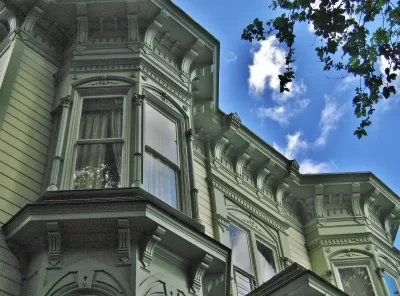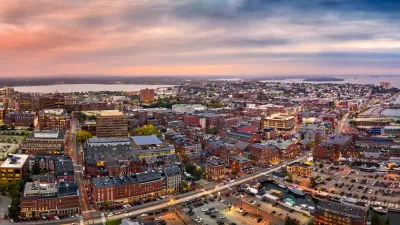A longtime resident of an old, eclectic neighborhood reflects on what makes the area so desirable and why new places like it are effectively outlawed today.

For decades, Robert Liberty has called Northwest Portland home. Blessed by an eclectic mix of housing types and uses, his neighborhood plays host to diverse residents, young and old, and a collection of small businesses including restaurants, grocers, dry cleaners, small warehouses, and a sheet metal company.
Liberty laments that despite the obvious character his neighborhood exhibits - and the high premiums residents pay to live there - the area is "illegal" in most modern zoning schemes. He writes, "residential zoning today has carried class separation to great extremes, which you can see if you travel by air: Over here, big single-family homes on big lots. Over there a mobile home park."
The desire to preserve parking, to segregate immigrants and the poor, and to guard land value and "neighborhood character" has led, ironically, to a shortage of adaptable urban environments. Liberty concludes, "Does that mean do away with all regulations? No. But it does mean that we need to stop assuming that everyone wants to, or can afford to, live in a big-house on a big lot in a residential-only neighborhood."
FULL STORY: My illegal neighborhood

Planetizen Federal Action Tracker
A weekly monitor of how Trump’s orders and actions are impacting planners and planning in America.

Maui's Vacation Rental Debate Turns Ugly
Verbal attacks, misinformation campaigns and fistfights plague a high-stakes debate to convert thousands of vacation rentals into long-term housing.

Restaurant Patios Were a Pandemic Win — Why Were They so Hard to Keep?
Social distancing requirements and changes in travel patterns prompted cities to pilot new uses for street and sidewalk space. Then it got complicated.

In California Battle of Housing vs. Environment, Housing Just Won
A new state law significantly limits the power of CEQA, an environmental review law that served as a powerful tool for blocking new development.

Boulder Eliminates Parking Minimums Citywide
Officials estimate the cost of building a single underground parking space at up to $100,000.

Orange County, Florida Adopts Largest US “Sprawl Repair” Code
The ‘Orange Code’ seeks to rectify decades of sprawl-inducing, car-oriented development.
Urban Design for Planners 1: Software Tools
This six-course series explores essential urban design concepts using open source software and equips planners with the tools they need to participate fully in the urban design process.
Planning for Universal Design
Learn the tools for implementing Universal Design in planning regulations.
Heyer Gruel & Associates PA
JM Goldson LLC
Custer County Colorado
City of Camden Redevelopment Agency
City of Astoria
Transportation Research & Education Center (TREC) at Portland State University
Jefferson Parish Government
Camden Redevelopment Agency
City of Claremont





























